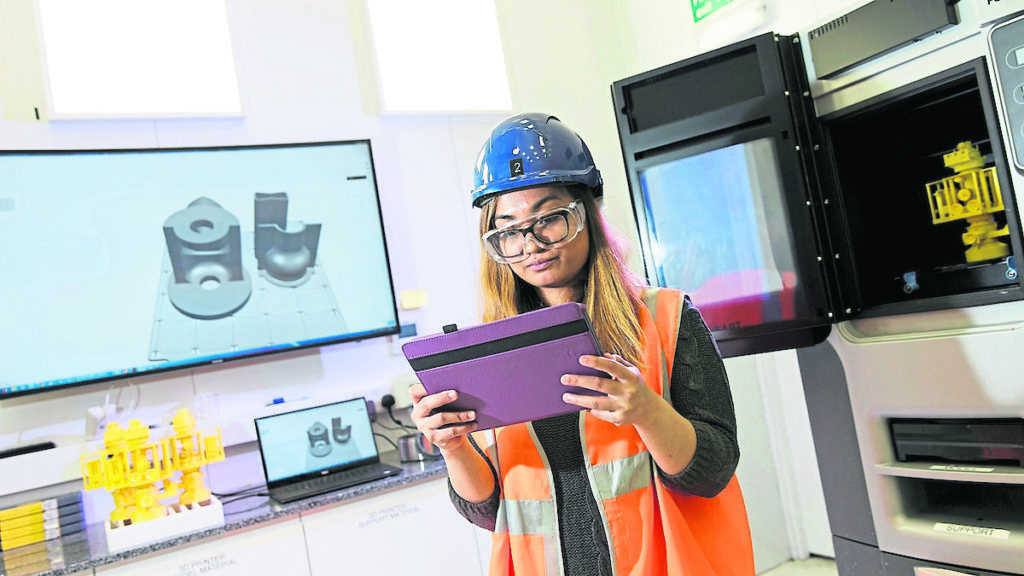
Oil service giant Baker Hughes GE (BHGE) has said its new £31million centre of excellence at Montrose will help maintain a “knowledge bank” in the north-east at a time when the threat of skills shortages is growing.
The subsea technology centre will also provide a prime example of lessons from the aviation and automotive industries being applied to the subsea sector.
More than 100 new jobs will be created at the base, which will be one of the most advanced in the world, boasting facilities for testing and assembly, research and development and also workforce training.
Employees will have access to virtual reality tools, industrial 3D printing, automation and sensor-equipped machines.
Asked why Montrose was picked as the centre’s location, Graham Gillies, a vice-president at BHGE, said: “There are a host of locations where you could create a centre of excellence.
“Scotland is steeped in 70 years of expertise in offshore and subsea.
“It has a large knowledge base with established vendors and
suppliers in the region.
“We’ve been investing periodically in our Montrose infrastructure in the last few years so it was a natural progression to say it makes sense to drive efficiency and productivity.
“You create one location with all knowledge of subsea capability in one environment and you get the ability to harness experience that has been created over a number of years.
“Then you are exporting that on behalf of Scotland and the UK.
“Every year we’re involved in something cutting-edge from a perspective of developing fields, so the ability to harness that in one place is helpful for BHGE and for maintaining a knowledge bank in north-east Scotland.”
The news will have come as a boost to the Angus town.
It is not that long ago, in late-2016, in fact, that GE Oil & Gas, which subsequently merged with Baker Hughes to form BHGE, said it was in consultation over 32 potential job losses there. Mr Gillies said the hiring of new recruits would be a gradual process and that the company had a “transition plan”, with plenty of training provided.
He said: “We’ve been developing employee’s skills for automated processes, while universities and colleges are already exposing students to new technologies trending in industry.
“The younger people coming through are probably better versed than a lot of the mature employees so it’s a good mix of skills coming through, but we’ll
definitely have to train.”
Mr Gillies said coping with the skills gap which has developed during the downturn was a “challenge” for all
companies.
He said: “We are seeing a generational gap from the downturn. For sure, as we have gone through the last cycle people have been attracted to different industries and that’s something oil and gas has to compete with.”
BHGE does not expect the project to be affected by parent company GE’s plans to sell its stake in the business.
GE announced the move in June, about a year after BHGE’s launch.
It will construct a new 43,055sq ft building and expand an existing warehouse.
Work on the project is under way, with completion expected early next year. Equipment built at the centre will be capable of supporting projects across the world.
The firm intends to develop products which can lower costs, enhance productivity and lower the carbon footprint of oil and gas operations in demanding environments.
Mr Gillies said: “We have looked at processes to bring efficiency and productivity to operations. It’s about creating sustainability in subsea industry and looking at how we apply lessons from aviation and automotive industries.
“We’ve got laser measuring equipment, which will provide better accuracy for building, designing and tracking equipment and how you improve the flow through the shop.
It removes errors and increases yield.
“We’re automating some welding techniques to remove errors and that gives us leaner non-destructive testing processes through having digital X-ray processes.
“Today our industry works quite heavily on traditional materials –
carbons, steels, and alloy. There’s an opportunity to think about how we can introduce additive manufacturing capabilities into our supply chain.
“We still need to go through rigorous testing.
“But it’s how you increase the efficiency in the SC and use new technology to reduce costs.
“Digital X-ray and laser measuring are things we’ve seen in adjacent industries. We’ve identified that they’d be good in oil and gas.”
Recommended for you

